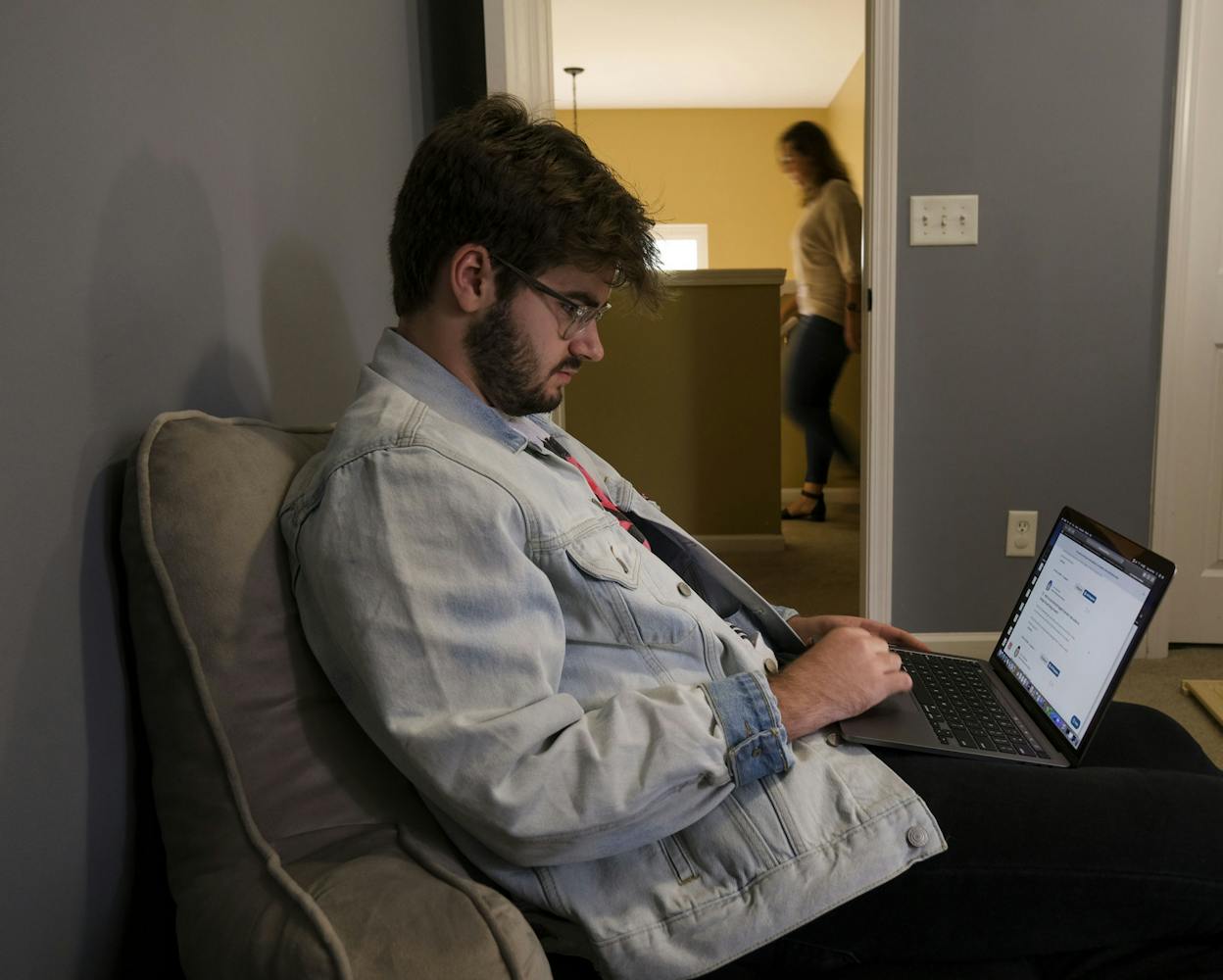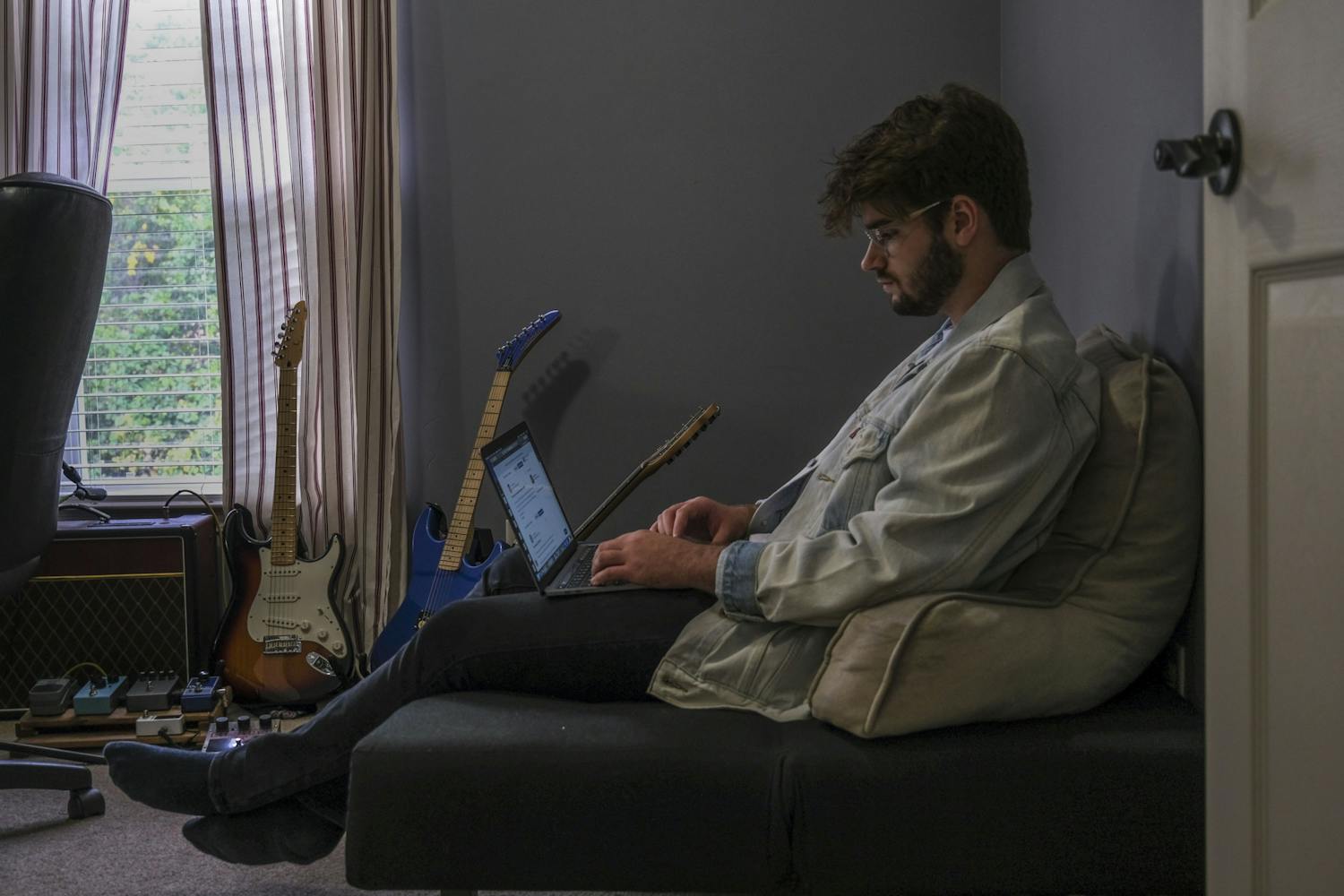Instead of decorating a dorm room as planned, Schroth spent some time creating a study space in her room to give herself a similar environment to work in.
"I have no other places to study in my house to study without interruptions," she said.
Schroth said she also faces internet connection issues, as other members of her family are working from home as well.
"It's kind of hard because my mom's a teacher, so her teaching virtually from home, and my dad also works from home right now, so there's a lot of internet usage throughout the day, so it's hard to get stuff done because I don't have the best internet in my room, and going outside my room, I get distracted," she said.
Many freshmen are feeling disconnected from the university and fear they are missing out on key elements of the overall college experience because they are not on campus. The main concerns about the virtual setup of this semester are lack of academic resources and social interaction.
Marketing and Spanish freshman Hannah Diggs, who takes classes from her home in Kalamazoo, Michigan, said she's feeling a bit unsupported this fall.
"As far as the school sometimes I feel we are hung out to dry a little bit, and it's left to us without much support from them," she said.
Diggs said her biggest issue with virtual learning has been the unaccommodating office hours schedule. She works and babysits on the side, so most of her time outside of class is occupied by those commitments. Because she can't always make it to office hours, her resources are a bit more limited.
Business-preference freshman Avya Ramprasad, who attends MSU from Troy, Michigan, said while she's finding it easy enough to take classes independently, she doesn't know what resources she has to turn to when she does need help. With minimal opportunities for interaction with classmates and inconvenient office hours schedules , she said it seems like finding academic support takes a bit more effort.
"I don't really reach out to the counselors," Ramprasad said. "I don't really reach out to anyone ... It has been stressful but I just really don't know about any of the opportunities we have."
Being on Zoom all day and having the only virtual human interaction through a laptop screen is unappealing. After a few times, the virtual trivia nights just aren't enough to replace the experience of going to student events on campus and connecting with others in ways that are just not possible right now.
While upperclassmen are feeling the loss of the physical aspects of the college experience this year, freshmen are wondering what they've missed out on, and there's a good possibility that remote learning will be their reality for a second semester, potentially even after.
There are other conflicts with the engagement efforts by the university and student organizations. Many students who are staying home have jobs and other responsibilities, trying to squeeze them into a cramped school schedule, so there isn't always time to attend these events.
Aside from feeling isolated from their peers, much of the freshman class has expressed other concerns: being unaware of any resources available to assist them in learning independently, a lack of experience in online education prior to this school year and the mental health impacts that the stress of beginning college in such a confusing atmosphere will have on them.
While freshmen are figuring out how to juggle the pressure of being a college student on top of prior personal commitments, they're finding that in this new learning environment they are having to let go of assignments and class meetings to prioritize their mental well-being.
"When I'm not at school I'm working, and then as soon as I come home I have to bust out homework, but I don't want to," James Madison freshman Olivia Torres said. "It kind of gets exhausting, so you let things slide, and you let homework slide. You say 'maybe I'll just miss this class tomorrow so I don't feel like I'm going crazy.'"
Torres ended up having to relocate from her hometown to Midland, Michigan, in order to find a job because of the sudden changes to the plan for this semester.
Torres said she is frustrated as a student who is paying their tuition independently.
Support student media!
Please consider donating to The State News and help fund the future of journalism.
"When I look over what they're charging me for, and all of these little fees ... that's an on-campus fee ... that's an on-campus fee ... I feel like I'm paying for things I don't get to use," she said.
She also voiced concerns about communication from the university.
"The communication between the university and us can be significantly better," Torres said. "... It's just very minimal."
For some, the switch to online classes has had some benefits, like for James Madison sophomore Rea Hickox, who has a visa accommodation from MSU’s Resource Center for Persons with Disabilities, or RCPD.
"It wasn't quite as isolating because normally I'm kind of chucked in the back of the classroom, and since everyone is on Zoom that wasn't as much of a problem," Hickox said.
Additionally, she said that although she feels that Zoom class has evened the playing field for her in one way, there are still things that take away from a positive learning experience, including issues with D2L not functioning correctly.
Hickox also said that more flexible deadlines would enhance the ability of students to turn in their work. With the pandemic continuing to impact students and their families, most are having to continue following schedules and routines that they had before remote classes entered the picture.
In some instances, Hickox has had to drive nearly half an hour from her home in Dallas to find reliable internet because the connection is so heavily used in an age where everyone is working or taking classes virtually.
"I'd rather not have to drive out sometimes like 25 minutes just to do my homework," she said. "You have to pick everything up and go. I guess there are technically restaurants, but that's a great place to catch COVID because no one has their mask on."
For some students, the hardest thing about being a first-year Spartan this fall is the disappointment of not being able to get the full extent of the MSU experience. This is a unique circumstance for this year's freshman class.
"I think that's the hardest thing for me just because that's what I was most expecting when I was going to college, living independently and meeting new people," Ramprasad said. "That has been really, really, really hard, and I just really don't know how to cope with it."
Alyse Collins, an academic adviser in the Lyman Briggs College, said a majority of resources like tutoring and advising have been translated into online formats to make them accessible to remote learners.
"The same resources are available, it just looks a little bit different and the modality is different," Collins said.
There are a few different places Collins recommends checking for help when needed. She said the best place to look first is the syllabus, which usually has a schedule for office hours and links for accessing these meetings.
She also recommends checking D2L announcements, content and class lists. The class list can help students make connections with people in their courses that they can ask questions and allows them to come to campus when in-person instruction has resumed with potential friends rather than starting from scratch.
She also emphasized the importance of reaching out to professors, learning and teaching assistants and advisers. While this can be daunting for students who have no experience trying to initiate conversation and form connections with faculty, she said it's easy to ask questions in the class setting over a Zoom chat, and it might even benefit other students.
"I guarantee you, if you have that question, other students have that question as well," Collins said.
For undecided or exploratory preference students who are now left without a lot of hands-on experiences that could point them in the right direction of a major, Collins said that engaging with peers and advising staff is crucial this semester. Additionally, she recommends engaging virtually with at least one club or student event just to try something different that can lead to new interests.
Aside from the obvious frustrations that have come about from remote learning, freshmen who chose to stay home as requested by MSU rather than getting an off-campus apartment are also feeling as if they're being punished for the actions of their peers.
"If people aren't being responsible now in the fall semester when no one's supposed to be on campus ... if everyone comes back to campus it's going to be ... worse," Diggs said.
While campus is no longer buzzing with students cramming for exams in the libraries or rushing to a dining hall for a bite with friends between classes, Collins said she sees the MSU student body is just as active online.
"The one time I drove through campus, it was really strange to see almost no cars in the parking lot," Collins said. "It was a bit of a ghost town, but then I pop online and it's this flurry of activity. Connections are happening, conversations are being had, which is very encouraging. So, even though we're not physically there we are still carrying on," Collins said.
Collins said she tells students who come to her for advising that above all, it's important to "take care of yourself, make sure that you're sleeping, make sure that you're eating, that you're getting out and exercising as much as possible."
A recent petition started by a freshman calling on MSU to make this semester pass/fail rather than utilize the traditional grading scale to offset the impact of virtual learning on GPAs has been circulating online. It has over 3,900 signatures as of Oct. 24.
"It's not fair," Hickox said. "We're not in person. We don't have all these other resources that we would have had access to and for a lot of us, school is no longer the only priority. ... There should definitely be a curve of some kind."
The petition is being examined in the registrar's office currently, according to Collins.
"People certainly want what's best for the students," she said. "We're trying to make the impact of online learning as minimal as possible in a negative way. ... Conversations are being had as we speak."
Discussion
Share and discuss “1st-year students tackle unique challenges posed by remote semester” on social media.








